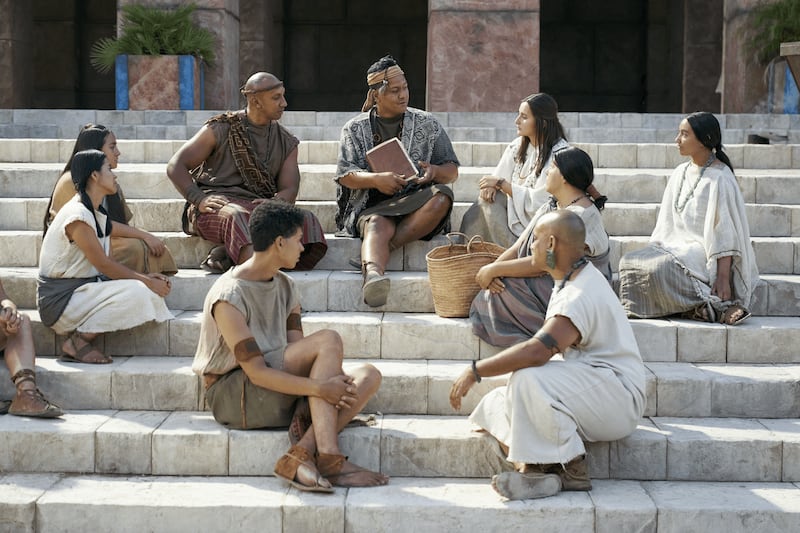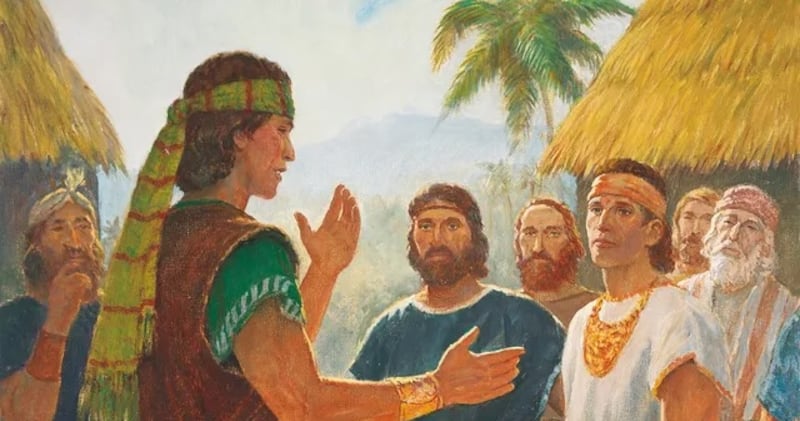This week’s “Come, Follow Me” study guide covers Mosiah 29-Alma 4, which includes the start of the reign of the judges, Nehor’s death and Amlici’s war against the Nephites.
Following are a few quotes from past and present Church leaders and scholars about these chapters.
Mosiah 29
“In public, what religious persons say and do involves other considerations. The free exercise of religion covers most public actions, but it is subject to qualifications necessary to accommodate the beliefs and practices of others. Laws can prohibit behavior that is generally recognized as wrong or unacceptable, like sexual exploitation, violence or terrorist behavior, even when done by extremists in the name of religion. Less grievous behaviors, even though unacceptable to some believers, may simply need to be endured if legalized by what a Book of Mormon prophet called ‘the voice of the people’ (Mosiah 29:26).
“On the subject of public discourse, we should all follow the gospel teachings to love our neighbor and avoid contention. Followers of Christ should be examples of civility. We should love all people, be good listeners and show concern for their sincere beliefs. Though we may disagree, we should not be disagreeable. Our stands and communications on controversial topics should not be contentious. We should be wise in explaining and pursuing our positions and in exercising our influence. In doing so, we ask that others not be offended by our sincere religious beliefs and the free exercise of our religion.”
— Then-Elder Dallin H. Oaks, now first counselor in the First Presidency, October 2014 general conference, “Loving Others and Living With Differences”
“Those who have served as public officials soon learn that there is always the imperative necessity of deciding whether or not demands on a controversial issue are being made by a well-organized loud minority or by a greater majority of those who might be less vocal but whose cause is just and in accordance with righteous principles. Always we would do well to reflect upon the counsel of a wise king of ancient times: ‘Now it is not common that the voice of the people desireth anything contrary to that which is right; but it is common for the lesser part of the people to desire that which is not right; therefore … do your business by the voice of the people’ (Mosiah 29:26).
“Let this counsel of that wise ancient king be our counsel to our Church members and the honorable of the earth everywhere. Be alert and active in your business and political interests. The great danger in any society is apathy and a failure to be alert to the issues of the day, when applied to principles or to the election of public officials.”
— President Harold B. Lee, April 1972 general conference, “A Time of Decision”

Alma 1
“The Book of Mormon contains the account of a man named Nehor. It is easy to understand why Mormon, in abridging a thousand years of Nephite records, thought it important to include something about this man and the enduring influence of his doctrine. Mormon was seeking to warn us, knowing that this philosophy would surface again in our day.
“Nehor appeared on the scene about 90 years before the birth of Christ. He taught ‘that all mankind should be saved at the last day… for the Lord had created all men, and had also redeemed all men; and, in the end, all men should have eternal life’ (Alma 1:4). …
“As in the days of Nehor … we live in a time not long before the advent of Jesus Christ — in our case, the time of preparation for His Second Coming. And similarly, the message of repentance is often not welcomed. Some profess that if there is a God, He makes no real demands upon us. Others maintain that a loving God forgives all sin based on simple confession, or if there actually is a punishment for sin, ‘God will beat us with a few stripes, and at last we shall be saved in the kingdom of God’ (2 Nephi 28:8). ...
“On the surface such philosophies seem appealing because they give us license to indulge any appetite or desire without concern for consequences. By using the teachings of Nehor … we can rationalize and justify anything. When prophets come crying repentance, it ‘throws cold water on the party.’ But in reality the prophetic call should be received with joy. ... Only through repentance do we gain access to the atoning grace of Jesus Christ and salvation. Repentance is a divine gift, and there should be a smile on our faces when we speak of it. It points us to freedom, confidence and peace.”
— Elder D. Todd Christofferson, Quorum of the Twelve Apostles, October 2011 general conference, “The Divine Gift of Repentance”
“The pleasures of the body can become an obsession for some; so too can the attention we give to our outward appearance. Sometimes there is a selfish excess of exercising, dieting, makeovers and spending money on the latest fashions (see Alma 1:27).
“I am troubled by the practice of extreme makeovers. Happiness comes from accepting the bodies we have been given as divine gifts and enhancing our natural attributes, not from remaking our bodies after the image of the world. The Lord wants us to be made over — but in His image, not in the image of the world, by receiving His image in our countenances.”
— Sister Susan W. Tanner, then the Young Women general president, October 2005 general conference, “The Sanctity of the Body”
“Patterns are meant to be repeated. A pattern of righteousness is worthy of duplication, yet there are those who suppose that our righteousness involves climbing some imaginary vertical ladder. We then think we hasten our progress by trying to get above or ahead of others. I believe this is pride. In Alma we are told, ‘The preacher was no better than the hearer, neither was the teacher any better than the learner; and thus they were all equal, and they did all labor, every man according to his strength’ (Alma 1:26). Righteousness is reproduced horizontally, not vertically. When we establish a pattern of righteousness in our lives, we commit to our Heavenly Father to do all in our power to help others reproduce this pattern in their lives.”
— Sister Janette C. Hales, then the second counselor in the Young Women general presidency, April 1991 general conference, “A Pattern of Righteousness”
Alma 2
“As the Savior’s disciples, we also bless our neighbors as we keep our covenants and lead Christlike lives. The Book of Mormon teaches that ‘the people of the church’ must not only choose righteousness but also make their righteous voices heard if they wish the Lord to protect and prosper them (see Alma 2:3–7). The Lord expects us to share our faith and beliefs and to hold up our light.”
— Elder Ronald A. Rasband, Quorum of the Twelve Apostles, in the June 2024 Liahona article “We Are Called To Do Good”
“Because today we are engaged in a war for the welfare of marriage and the home, in my latest reading of the Book of Mormon I paid particular attention to the ways the Nephites prepared for their battles against the Lamanites. I noted that the people of Nephi ‘were aware of the intent of [their enemy], and therefore they did prepare to meet them’ (Alma 2:12). As I read and studied, I learned that understanding the intent of an enemy is a key prerequisite to effective preparation. We likewise should consider the intent of our enemy in this latter-day war.”
— Elder David A. Bednar, Quorum of the Twelve Apostles, in the June 2006 Liahona article, “Marriage Is Essential to His Eternal Plan”

Alma 3
“The staining influence of Nehor can be seen … when Amlici rises to power, is crowned king by his followers, and wars against Alma and the Nephites. Mormon’s commentary helps us evaluate the lasting impact our attitudes and actions can have on others. He uses the word ‘distinguished’ (see Alma 2:11; 3:4) while explaining that Amlici’s followers desired so passionately to differentiate themselves from the Nephites that they changed their name to ‘Amlicites’ and ‘marked themselves with red in their foreheads’ (Alma 3:4). …
“When it comes to the generational influence we can have on our family, friends and fellow Saints, we would do well to ponder this question: Will we be distinguished for our dissension, like Nehor and the Amlicites, or will we be distinguished for our discipleship, like Alma and the Anti-Nephi-Lehies?”
— Benjamin Hyrum White, adjunct instructor of ancient scripture at Brigham Young University, April 2020 Ensign, “Nehor’s Narcissism: The Influence of a Popular Renegade”
“The scriptures describe two types of wisdom: the wisdom of the world and the wisdom of God. The wisdom of the world has both a positive and a negative component. In the darkest description, it could be described as a partial truth, mixed with intelligence and manipulation, to achieve selfish or evil purposes.
“An example from the Book of Mormon is the man Amlici. The scriptures say that ‘a certain man, being called Amlici, he being a very cunning man, yea, a wise man as to the wisdom of the world … [drew] away much people after him.’ The scriptures go on to describe Amlici as a ‘wicked man, … [whose] intent [was] to destroy the church of God’ (Alma 2:1–2, 4). We are not interested in this kind of wisdom.
“There is another kind of wisdom of the world that is not nearly so sinister. In fact it is very positive. This wisdom is consciously acquired through study, reflection, observation and hard work. It is very valuable and helpful in the things we do. To good and decent people, it comes as we experience our mortality.”
— Elder Neil L. Andersen, Quorum of the Twelve Apostles, in the January 2013 Ensign article “Reverence for God Is the Beginning of Wisdom”
Alma 4
“The Book of Mormon speaks of a time when ‘the people of the church began to be lifted up in the pride of their eyes, and … began to be scornful, one towards another, and … began to persecute those that did not believe according to their own will and pleasure’ (Alma 4:8). Let us all remember that God looketh not upon the color of the jersey or the political party. … Brothers and sisters, in the competitions of life, if we win, let us win with grace. If we lose, let us lose with grace. For if we live with grace toward one another, grace shall be our reward at the last day.”
— Elder Kevin R. Duncan, General Authority Seventy, April 2016 general conference, “The Healing Ointment of Forgiveness”
“I will speak first of the deceitfulness of riches. Wherever we are in our spiritual journey — whatever our state of conversion — we are all tempted by this. When attitudes or priorities are fixed on the acquisition, use or possession of property, we call that materialism. So much has been said and written about materialism that little needs to be added here. Those who believe in what has been called the theology of prosperity are suffering from the deceitfulness of riches. The possession of wealth or significant income is not a mark of heavenly favor, and their absence is not evidence of heavenly disfavor. …
“The Book of Mormon tells of a time when the Church of God ‘began to fail in its progress’ (Alma 4:10) because ‘the people of the church began to … set their hearts upon riches and upon the vain things of the world’ (Alma 4:8). Whoever has an abundance of material things is in jeopardy of being spiritually ‘sedated’ by riches and other things of the world.”
— Then-Elder Dallin H. Oaks, April 2015 general conference, “The Parable of the Sower”
“As a baptized member of the Church, I hear the invitation, and I wonder, ‘How do I get there from here?’ Because I know the Lord intends to include all of us in this invitation, my personal, honest response is … ‘I’m coming.’ Now, what is my duty? Alma reminded the people of Zarahemla of their duty, ending with the important phrase, ‘Come unto me and bring forth works of righteousness’ (Alma 5:35; see also Alma 4:3).”
— Sister Betty Jo N. Jepsen, then the first counselor in the Primary general presidency, October 1992 general conference, “‘By Way of Invitation’”
“One of the abiding tragedies of Nephite society was its failure to maintain spiritual strength through constant spiritual nourishment. …
“From Alma chapter 4 we read:
“’And thus, in this eighth year of the reign of the judges, there began to be great contentions among the people of the church; yea, there were envyings, and strife, and malice, and persecutions, and pride, even to exceed the pride of those who did not belong to the church of God. …
“’And the wickedness of the church was a great stumbling-block to those who did not belong to the church; and thus the church began to fail in its progress’ (Alma 4:9–10).
“The lesson is clear: if we do not constantly receive the spiritual nourishment needed daily, we will soon — as individuals and societies — be in dire straits, bereft of God’s protection, cut off from the healing influences of the Spirit. Just as one who is weakened by malnutrition soon may fall prey to infectious disease, so, too, will we, if spiritually weakened, be ready prey for the adversary and his legions of dupes and devils.”
— Elder Alexander B. Morrison, then a General Authority Seventy, April 1992 general conference, “Nourish the Flock of Christ”




